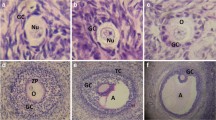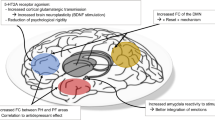Abstract
Purpose
In this review, we provide an overview of recent literature on the use of estrogen-based hormone therapy to treat depression related to reproductive events, like postpartum and perimenopause. Women are two to four times more likely to become depressed in the perimenopausal stage of life and as many as 14.5% of women develop postpartum depression. It is hypothesized that these depressive symptoms are a result of fluctuations in hormone levels during these windows of vulnerability. To broaden treatment options beyond psychotherapy and antidepressants, researchers considered the role that estrogen-based hormone therapy can play during these periods of fluctuation.
Recent findings
Research on the use of estrogen-based therapy to treat depression in premenstrual syndrome, postpartum, perimenopause, and postmenopause is varied and even contradictory at times. Overall, literature suggests that the right combination, dose, and duration of estrogen therapy can have positive effects on depressive symptoms related to reproductive events.
Summary
In the past, estrogen-based hormone therapy has faced controversy regarding safety and efficacy, but researchers have since conducted trials that resulted in improved mood symptoms without significant side effects or risks. However, many experts caution against long-term use of estrogen therapy and emphasize the importance of prescribing a dose and method of delivery that best suits each individual patient.

Similar content being viewed by others
References and Recommended Reading
Papers of particular interest, published recently, have been highlighted as: • Of importance
Gaynes BN, Gavin N, Meltzer-Brody S, et al. Perinatal depression: prevalence, screening accuracy, and screening outcomes. Evid Rep Technol Assess (Summ). 2005;119:1–8.
Enmark E, Pelto-Huikko M, Grandien KAJ, Lagercrantz S, Lagercrantz J, Fried G, ... Gustafsson JA. Human estrogen receptor β-gene structure, chromosomal localization, and expression pattern. J Clin Endocrinol Metab. 1997;82(12):4258–4265.
Sood R, Faubion SS, Kuhle CL, Thielen JM, Shuster LT. Prescribing menopausal hormone therapy: an evidence-based approach. Int J Womens Health. 2014;6:47–57.
Brunner RL, Gass M, Aragaki A, Hays J, Granek I, Woods N, et al. Effects of conjugated equine estrogen on health-related quality of life in postmenopausal women with hysterectomy: results from the Women’s Health Initiative Randomized Clinical Trial. Arch Intern Med. 2005;165:1976–86.
Cohen LS, Soares CN, Poitras JR, Prouty J, Alexander AB, Shifren JL. Short-term use of estradiol for depression in perimenopausal and postmenopausal women: a preliminary report. Am J Psychiatry. 2003;160:1519–22.
Schmidt PJ, Nieman L, Danaceau MA, Tobin MB, Roca CA, Murphy JH, et al. Estrogen replacement in perimenopause-related depression: a preliminary report. Am J Obstet Gynecol. 2000;414–20(35):183.
Rasgon NL, Altshuler LL, Fairbanks L, Dunkin J, Davtyan C, Elman S, et al. Estrogen replacement therapy in the treatment of major depression in perimenopausal women. J Clin Psychiatry. 2002;63(S7):45–8.
• Gordon JL, Rubinow DR, Eisenlohr-Moul TA, Xia K, Schmidt PJ, Girdler SS. Efficacy of Transdermal Estradiol and Micronized Progesterone in the Prevention of Depressive Symptoms in the Menopause Transition: A Randomized Clinical Trial. JAMA Psychiatry. 2018;75(2):149–57 A recent study on prescribing hormone therapy to prevent for depression in the menopause transition, which explores an important perspective of prevention as opposed to treatment.
Schneider LS, Small GW, Clary CM. Estrogen replacement therapy and antidepressant response to sertraline in older depressed women. Am J Geriatr Psychiatry. 2001;9:393–9.
Craig M. Should psychiatrists be prescribing estrogen therapy to their female patient? Br J Psychiatry. 2013;202:9–13. https://doi.org/10.1192/bjp.bp.111.102855.
Gundlah C, Kohama SG, Mirkes SJ, Garyfallou VT, Urbanski HF, Bethea CL. Distribution of estrogen receptor beta (ERbeta) mRNA in hypothalamus, midbrain and temporal lobe of spayed macaque: continued expression with hormone replacement. Brain Res Mol Brain Res. 2000;76:191–204.
Deecher D, Andree TH, Sloan D, Schechter LE. From menarche to menopause: exploring the underlying biology of depression in women experiencing hormonal changes. Psychoneuroendocrinology. 2008;33(1):3–17.
Freeman EW, Sammel MD, Liu L. Hormones and menopausal status as predictors of depression in women in transition to menopause. Arch Gen Psychiatry. 2004;61(1):62–70.
Wisner KL, Sit DK, Moses-Kolko EL, Driscoll KE, Prairie B, Stika CS, et al. Transdermal estradiol treatment for postpartum depression: a pilot randomized trial. 2009;52(3):516–29.
Liu B. Is transdermal menopausal hormone therapy a safer option than oral therapy? CMAJ. 2013;185(7):549–50.
Tsai S, Stefanick M, Stafford R. Trends in menopausal hormone therapy use of U.S. office-based physicians, 2000-2009. Menopause. 2011;18:385–92.
• Gartlehner G, Patel SV, Feltner C, et al. Hormone therapy for the primary prevention of chronic conditions in postmenopausal women: evidence report and systematic review for the US preventive services task force. JAMA. 2017;318(22):2234–49 A recent, comprehensive review exploring the hormone therapy as a preventative measure for mood symptoms in postmenopausal women.
Bloch M, Schmidt PJ, Danaceau M, Murphy J, Nieman L, Rubinow DR. Effects of gonadal steroids in women with a history of postpartum depression. Am J Psychiatr. 2000;157(6):924–30.
Mehta D, Newport DJ, Frishman G, Kraus L, Rex-Haffner M, Ritchie JC, et al. Early predictive biomarkers for postpartum depression point to a role for estrogen receptor signaling. Psychol Med. 2014;44:2309–22.
Gregoire AJ, Kumar R, Everitt B, Henderson AF, Studd JWW. Transdermal oestrogen for treatment of severe postnatal depression. Lancet. 1996;347:930–3.
Ahokas A, Kaukoranta J, Wahlbeck K, Aito M. Estrogen deficiency in severe postpartum depression: successful treatment with sublingual physiologic 17B-estradiol: a preliminary study. J Clin Psychiatry. 2001;62(5):332–6.
Kelsey JJ. Hormonal contraception and lactation. J Hum Lact. 1996;12(4):315–8.
Bromberger JT, Kravitz HM, Chang YF, Cyranowski JM, Brown C, Matthews KA. Major depression during and after the menopausal transition: Study of Women’s Health Across the Nation (SWAN). Psychol Med. 2011;41(9):1879–88.
de Novaes Soares C, Almeida OP, Joffe H, Cohen LS. Efficacy of estradiol for the treatment of depressive disorders in perimenopausal women: a double-blind, randomized, placebo-controlled trial. Arch Gen Psychiatry. 2001;58(6):529–34.
• Gleason CE, Dowling NM, Wharton W, Manson JE, Miller VM, Atwood CS, et al. Effects of hormone therapy on cognition and mood in recently postmenopausal women: findings from the randomized, controlled KEEPS-cognitive and affective study. PLoS Med. 2015;12(6):e1001833 An important article that explores the effects of hormone therapy on both cognition and mood in recently postmenopausal women, and sheds light on other potential positive effects of HT aside in addition to alleviating mood symptoms in this population.
Rasgon NL, Geist CL, Kenna HA, Wroolie TE, Williams KE, Silverman DH. Prospective randomized trial to assess effects of continuing hormone therapy on cerebral function in postmenopausal women at risk for dementia. PLoS One. 2014;9(3):e89095.
Magos AL, Studd JWW. The premenstrual syndrome. In: Progress in Obstetrics and Gynaecology (ed. J Stuff). Churchill Livingstone:Edinburgh; 1984. pp. 334–50.
Dubey N, Hoffman JF, Schuebel K, Yuan Q, Martinez PE, Nieman LK., ... Goldman D. The ESC/E (Z) complex, an effector of response to ovarian steroids, manifests an intrinsic difference in cells from women with premenstrual dysphoric disorder. Mol Psychiatry. 2017;22(8):1172–1184.
Pearlstein TB, Bachmann GA, Zacur HA, Yonkers KA. Treatment of premenstrual dysphoric disorder with a new drospirenone-containing oral contraceptive formulation. Contraception. 2005;72:414–21.
Green LJ, O’Brien PMS, Panay N, Craig M on behalf of the Royal College of Obstetricians and Gynaecologists. Management of premenstrual syndrome. Br J Obst Gynaecol 2017;124:e73–e105.
Lopez LM, Kaptein AA, Helmerhorst FM. Oral contraceptives containing drospirenone for premenstrual syndrome. Cochrane Database Syst Rev. 2012;2:CD006586.
• Naheed B, Kuiper JH, Oa U, O’Mahony F, O’Brien PMS. Non-contraceptive oestrogen-containing preparations for controlling symptoms of premenstrual syndrome. Cochrane Database Syst Rev. 2017;3:CD010503 A recent and important piece highlighting the potential use of non-contraceptive estrogen-based hormone therapy for women suffering from premenstrual syndrome.
Author information
Authors and Affiliations
Corresponding author
Ethics declarations
Conflict of interest
Dr. Rasgon reports other from Sunovion Pharmaceuticals, outside the submitted work.
Alison Myoraku and Thalia Robakis declare that they have no conflict of interest.
Human and animal rights and informed consent
This article does contain studies performed by the authors.
Additional information
This article is part of the Topical Collection on Mood Disorders
Rights and permissions
About this article
Cite this article
Myoraku, A., Robakis, T. & Rasgon, N. Estrogen-Based Hormone Therapy for Depression Related to Reproductive Events. Curr Treat Options Psych 5, 416–424 (2018). https://doi.org/10.1007/s40501-018-0156-y
Published:
Issue Date:
DOI: https://doi.org/10.1007/s40501-018-0156-y




